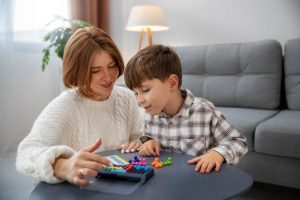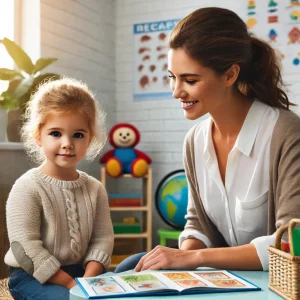Empower Parents: Workshops on Emotional Regulation
Last Updated: September 19, 2024
Have you ever felt overwhelmed by your emotions, especially when juggling the many responsibilities of parenting? You’re not alone. Emotional regulation, or the ability to manage and respond to your feelings in a healthy way, plays a crucial role in how we handle daily stresses, communicate with our loved ones, and navigate the ups and downs of life. As parents, mastering this skill is even more important because our children learn from our reactions and behaviors. When we manage our emotions well, we set a positive example for them, helping them to build their own emotional resilience.
But let’s face it, parenting is tough, and sometimes our emotions get the best of us. This is where workshops on emotional regulation come in. These workshops are designed to empower parents with the tools and strategies they need to better understand their emotions and respond to challenges more calmly and effectively. By learning how to regulate your emotions, you’re not just improving your own mental well-being—you’re also creating a more supportive and nurturing environment for your kids.
Also read: Emotional Regulation for Kids: Easy Tips and Activities
Understanding Emotional Regulation
Ever had one of those days where your emotions seem to run the show? Whether it’s the frustration of a hectic morning or the anxiety of managing your child’s behavior, emotions play a big part in how we handle parenting. Emotional regulation is simply the ability to manage and respond to these emotions in a healthy, balanced way. It’s about knowing when to take a deep breath instead of raising your voice, or how to stay calm when things don’t go as planned. For parents, mastering emotional regulation can feel like finding a secret tool that makes daily challenges a bit more manageable.
But why is emotional regulation so important in parenting? Think of it this way: children look up to their parents as models for how to act and react. When parents can regulate their own emotions, they teach their kids valuable skills like patience, resilience, and how to handle stress. This sets a strong foundation for your child’s emotional development, helping them grow into confident and emotionally healthy individuals. On the other hand, if parents struggle with emotional regulation, it can lead to increased stress within the family, misunderstandings, and even behavioral issues in children.
Also read: Fun 7 Activities to Boost Emotional Regulation in Young Children
The Importance of Emotional Regulation for Parents
As parents, we often wear many hats—caretaker, teacher, coach, and sometimes even referee. In these roles, managing our emotions plays a crucial part in how effectively we can support and guide our children. Emotional regulation is more than just keeping your cool; it’s about being aware of your feelings, understanding how they influence your actions, and knowing how to channel them in positive ways. When parents master emotional regulation, it can significantly enhance their parenting skills, leading to a more harmonious and supportive family environment.
1. Improving Parenting Skills Through Emotional Regulation
Managing your emotions can directly improve your parenting skills in various ways. For starters, when you’re calm and collected, you’re better equipped to respond thoughtfully rather than react impulsively. This means you’re more likely to set clear boundaries, offer guidance with patience, and model the kind of behavior you want to see in your children. It’s no secret that kids mirror our actions, so by regulating your emotions, you’re teaching them valuable life skills like patience, empathy, and problem-solving.
2. Impact on Family Dynamics
Have you noticed how one person’s mood can shift the whole atmosphere at home? Emotional regulation plays a significant role in shaping the overall family dynamics. When parents can manage their emotions effectively, it creates a ripple effect that promotes a calmer, more supportive environment. This doesn’t mean that every day will be perfect, but it does mean that there will be fewer escalated conflicts, more understanding, and a stronger sense of connection among family members. Kids feel more secure and are likely to be more open and communicative when they know their parents can handle stress and emotions constructively.
3. Enhancing Communication and Conflict Resolution
Good communication is at the heart of any healthy relationship, and it’s especially vital in families. Emotional regulation helps parents communicate more clearly and effectively, even during disagreements. Instead of letting frustration drive the conversation, you can express your needs and concerns in a way that invites cooperation rather than conflict. This skill is invaluable for conflict resolution within the family—whether it’s between siblings or between parent and child. When you handle conflicts with calm and control, you’re not just resolving the issue at hand; you’re also teaching your children how to navigate their own challenges with maturity and respect.
What Parents Can Learn from Emotional Regulation Workshops
Emotional regulation workshops are like a toolbox filled with practical skills and strategies that parents can use every day. These workshops are designed to help parents understand their emotions better and equip them with the tools needed to navigate the often challenging world of parenting. Let’s take a closer look at what you can learn from these workshops and how these skills can make a real difference in your daily life.
1. Key Skills and Strategies Taught in Workshops
In emotional regulation workshops, parents are introduced to a range of techniques that help manage emotions effectively. Common skills taught include mindfulness, stress management, and emotional awareness:
- Mindfulness: This practice helps you stay present in the moment, making it easier to respond to your child calmly rather than react impulsively. Imagine taking a deep breath and pausing before you respond to a tantrum or a heated moment—mindfulness can make that possible.
- Stress Management: Parenting is filled with stressful moments, from morning rushes to bedtime battles. Workshops often teach stress management techniques, such as breathing exercises or quick relaxation methods, that you can use whenever you feel overwhelmed.
- Emotional Awareness: Understanding your emotions is the first step to managing them. Workshops guide parents in recognizing their triggers, understanding their emotional responses, and learning how to shift those responses in a healthier direction.
2. Practical Applications in Everyday Parenting
These skills aren’t just theoretical—they have real, practical applications in your daily parenting routines. For instance, when you practice mindfulness, you can better handle those unexpected outbursts from your child with patience and understanding. Stress management techniques help you stay calm when the day doesn’t go as planned, reducing the likelihood of escalating conflicts at home. By increasing your emotional awareness, you become more attuned to your own needs and can set a positive example for your children on how to handle their emotions.
For example, if your child is having a tough time managing their feelings, your ability to model calmness and provide clear, supportive guidance can make a huge difference. Rather than reacting with frustration, you can use what you’ve learned to help them work through their emotions, building a stronger parent-child connection.
Comparing Emotional Regulation Techniques
| Technique | Description | When to Use |
|---|---|---|
| Mindfulness | Mindfulness involves paying attention to the present moment without judgment. It helps parents stay calm, focused, and better equipped to handle parenting challenges. Techniques include deep breathing, body scans, and mindful observation of surroundings. | Use mindfulness during stressful or busy moments, like when handling a tantrum, during morning rushes, or when feeling distracted and overwhelmed. |
| Stress Management | Stress management techniques help reduce the impact of stress on your mind and body. Common methods include deep breathing exercises, progressive muscle relaxation, visualization, and short breaks to reset. These techniques help lower stress levels and bring a sense of calm and control. | Use stress management techniques when feeling overwhelmed, such as during conflict with your child, after a long day, or when juggling multiple tasks at once. |
| Emotional Awareness | Emotional awareness is the ability to recognize and understand your own emotions and their impact on your behavior. It includes identifying emotional triggers, understanding how emotions influence your reactions, and learning to shift from automatic responses to more thoughtful ones. | Practice emotional awareness throughout the day, especially during conflicts or emotionally charged situations, like arguments, stressful family interactions, or moments when you feel triggered. |
Key Components of Effective Emotional Regulation Workshops
Emotional regulation workshops are designed to be practical and engaging, offering parents a chance to learn in a structured yet supportive environment. These workshops typically combine various elements to ensure that participants not only learn but also feel comfortable applying the skills in their daily lives. Let’s look at what makes these workshops effective and worthwhile for parents.
1. Structure of a Typical Workshop
A typical emotional regulation workshop usually consists of several sessions that are interactive and hands-on. Each session might include:
- Interactive Activities: These could be group discussions, role-playing exercises, or real-life scenario practices that help parents learn by doing. For example, parents might practice mindfulness exercises together or simulate stressful parenting situations to explore different ways of responding.
- Guided Sessions: These are led by professionals who guide parents through key topics, like understanding triggers or practicing stress management techniques. The goal is to break down complex concepts into easy-to-understand steps that parents can apply at home.
- Homework and Reflection: Some workshops offer simple exercises or reflections to try between sessions. This helps parents put what they learn into practice and reflect on what works best for them.
2. Importance of a Safe, Supportive Environment
One of the most important aspects of these workshops is creating a safe, supportive environment where parents feel comfortable sharing and learning. Emotional regulation can be a sensitive topic, and it’s essential that participants feel understood and not judged. A good workshop will make sure everyone feels included and valued, allowing parents to open up about their experiences and learn from each other.
When parents feel safe, they are more likely to engage fully, ask questions, and try new techniques. This sense of community and support can be incredibly powerful, helping parents not only learn new skills but also feel less alone in their challenges.
3. Involvement of Professionals
Effective workshops are usually led by trained professionals, such as psychologists, therapists, or counselors who specialize in emotional regulation and parenting. These experts bring valuable knowledge and experience to the sessions, providing guidance that is both practical and research-based.
For instance, a psychologist might explain why certain emotional reactions occur and offer evidence-based strategies to manage them. Having professionals involved ensures that the advice and techniques shared are trustworthy and tailored to meet the specific needs of parents.
Benefits of Attending Emotional Regulation Workshops
Attending emotional regulation workshops can be a game-changer for parents. These workshops are designed to equip you with the skills and understanding needed to navigate your own emotions, which can have a positive ripple effect on your entire family. Let’s dive into some of the key benefits you can expect from participating in these workshops.
1. Improved Emotional Awareness and Control
One of the first things you’ll notice after attending an emotional regulation workshop is a better understanding of your own emotions. You’ll learn how to recognize what you’re feeling and why, which is the first step toward managing those emotions effectively. With improved emotional awareness, you’ll find it easier to stay calm during stressful situations, making you feel more in control. This not only helps you handle everyday parenting challenges more smoothly but also boosts your confidence as a parent.
2. Better Parent-Child Relationships and Reduced Household Stress
When parents can manage their emotions well, it naturally leads to a more peaceful home environment. Children often pick up on their parents’ moods and reactions, and when you’re calm, it sets a positive tone for everyone. By attending workshops, you’ll learn techniques that help reduce stress in your household, like staying calm during tantrums or approaching conflicts with a problem-solving mindset. These skills can lead to better communication with your children, fewer arguments, and more moments of connection and joy.
3. Enhanced Ability to Model Healthy Emotional Regulation for Children
Children learn by watching the adults in their lives. When you demonstrate healthy emotional regulation, your children are more likely to adopt these behaviors themselves. Workshops teach you how to model calmness, patience, and thoughtful responses, which are valuable skills for kids to learn. As you practice these skills, your children see first-hand how to handle their own emotions, setting them up for success in school, friendships, and beyond.
4. Long-Term Benefits: Increased Resilience and Improved Mental Health for the Entire Family
The benefits of emotional regulation workshops extend far beyond immediate improvements in daily interactions. Over time, as you and your family practice these skills, you’ll build resilience—a crucial trait that helps everyone cope better with life’s ups and downs. This resilience can lead to improved mental health for both parents and children, reducing anxiety and fostering a sense of stability and security.
Practical Tips for Parents After Attending Workshops
Attending an emotional regulation workshop is a great first step, but the real impact comes from applying what you’ve learned in your daily life. Here are some practical tips to help you integrate these new skills into your parenting and make the most of your workshop experience.
1. Apply What You’ve Learned in Real-Life Situations
Start by using the techniques you’ve learned in everyday parenting moments. For example, if you practiced mindfulness during the workshop, try using it when your child is upset. Instead of reacting immediately, take a deep breath, pause, and then respond calmly. This small shift can turn a stressful situation into a teaching moment for both you and your child.
Another key strategy is to use the stress management techniques you learned, like deep breathing or quick relaxation exercises, during hectic times, such as getting ready for school or managing bedtime routines. The more you practice, the easier it becomes to stay calm and collected, even on the toughest days.
2. Be Consistent and Practice Regularly
Consistency is key when it comes to emotional regulation. Just like learning any new skill, the more you practice, the better you get. Make it a habit to use the techniques daily, even when things are going well. For instance, practice emotional awareness by checking in with yourself at different times of the day. Are you feeling stressed, tired, or overwhelmed? Recognizing these feelings early can help you manage them before they affect your interactions with your children.
You can also set aside a few minutes each day for mindfulness or relaxation exercises, either alone or with your child. This not only helps you stay consistent but also makes emotional regulation a regular part of your family’s routine. Remember, these small, regular efforts add up over time and can lead to big improvements in your emotional health and your relationship with your children.
3. Keep in Touch with Other Workshop Participants for Support
One of the best parts of attending workshops is connecting with other parents who are on the same journey. Staying in touch with these participants can provide ongoing support and encouragement. You can share successes, discuss challenges, and offer each other tips on how to keep practicing emotional regulation skills. Consider forming a small group chat or meeting up occasionally to continue learning from each other.
By maintaining these connections, you’re building a support network that can help you stay motivated and accountable. It’s reassuring to know that you’re not alone and that others are there to share the journey with you. This community aspect can be incredibly valuable as you continue to grow and apply what you’ve learned.
Conclusion
Emotional regulation is a valuable skill that can make parenting easier and more enjoyable. By learning how to manage your emotions, you can create a calmer and more positive environment for your family. Workshops on emotional regulation teach practical strategies like mindfulness, stress management, and emotional awareness, which can help you handle daily parenting challenges more smoothly. These skills not only benefit you as a parent but also set a strong example for your children, helping them learn how to manage their own emotions.
If you’re thinking about taking the next step, consider joining an emotional regulation workshop. It’s a great way to learn new skills and connect with other parents who are on the same journey. If a workshop feels like too much right now, you can start small by trying simple practices at home, like mindful breathing or pausing before responding to stressful moments. For more information, check out resources from Wellness Hub, where you can find support and guidance tailored to your needs. Remember, every small effort towards better emotional regulation can lead to a happier, more connected family life.
Frequently Asked Questions:
1. What are emotional regulation workshops for parents?
Emotional regulation workshops for parents are programs designed to help parents learn skills like mindfulness, stress management, and emotional awareness. These workshops provide practical tools and strategies to manage emotions effectively, which can improve parenting and family dynamics.
2. How can emotional regulation workshops benefit parents?
Emotional regulation workshops benefit parents by teaching them how to better understand and manage their emotions. This leads to improved parent-child relationships, reduced household stress, and the ability to model healthy emotional regulation for their children.
3. What do parents learn in emotional regulation workshops?
In emotional regulation workshops, parents learn key skills such as mindfulness, stress management, and emotional awareness. They are taught how to apply these skills in real-life situations, making everyday parenting challenges easier to handle.
4. Why is emotional regulation important for parents?
Emotional regulation is important for parents because it helps them stay calm and respond thoughtfully during stressful situations. This not only improves their own well-being but also creates a positive environment for their children, helping to foster better communication and stronger relationships.
5. How can I start practicing emotional regulation at home?
You can start practicing emotional regulation at home by using simple techniques like mindful breathing, taking a pause before responding to stress, and regularly checking in with your own emotions. These small steps can help you manage your emotions better and set a positive example for your children.
6. Are emotional regulation workshops led by professionals?
Yes, emotional regulation workshops are typically led by trained professionals such as psychologists, therapists, or counselors. These experts provide valuable guidance and support, helping parents learn and apply emotional regulation skills in a safe and supportive environment.
7. How do emotional regulation workshops help improve family life?
Emotional regulation workshops help improve family life by equipping parents with skills to handle stress and emotions effectively. This leads to a calmer household, better parent-child communication, and a stronger family bond.
8. Can emotional regulation workshops help with long-term mental health?
Yes, attending emotional regulation workshops can contribute to long-term mental health benefits. By consistently practicing emotional regulation, parents can build resilience, reduce anxiety, and improve overall family well-being.
9. How often should parents practice emotional regulation techniques?
Parents should practice emotional regulation techniques regularly, ideally integrating them into daily routines. Consistency is key to mastering these skills, and even small daily practices can lead to significant improvements over time.
10. Where can I find emotional regulation workshops for parents?
You can find emotional regulation workshops for parents through local community centers, online platforms, or specialized providers like Wellness Hub, which offers workshops and resources tailored to help parents improve their emotional regulation skills.
About Author:
Lasya Vooturi,
Clinical Psychologist (A) & Behavioral Therapist
Lasya holds a Professional Diploma in Clinical Psychology from Amity University, where she deepened her understanding of psychological principles from March 2023 to March 2024. With over a year of dedicated experience as a Behavioral Therapist, Lasya has honed her skills in applying effective therapy techniques tailored to individual needs. Fluent in Telugu, Hindi, and English, she is adept at connecting with a diverse range of clients, ensuring comprehensive communication and understanding. Lasya’s approach is grounded in empathy and scientific rigor, making her a trusted ally in navigating mental health challenges.
Book your Free Consultation Today
Parent/Caregiver Info:
Client’s Details:
* Error Message








